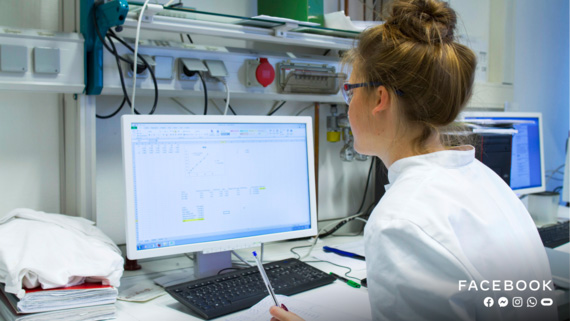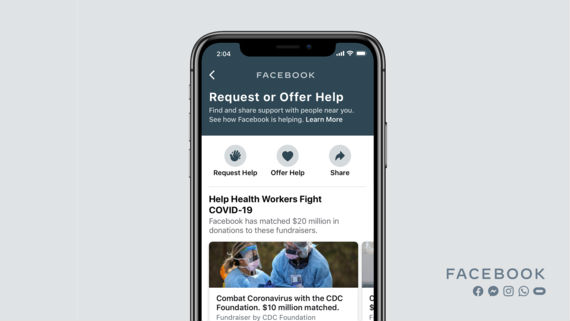The Hill’s Morning Report – Presented by Facebook – House set to pass $483B COVID bill; Lawmakers jockey over next package

Presented by Facebook
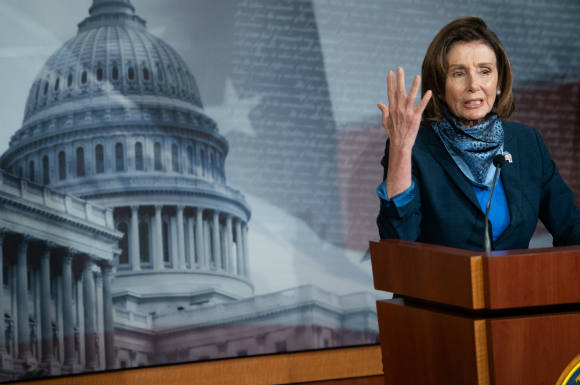
Welcome to The Hill’s Morning Report. It’s Thursday. We get you up to speed on the most important developments in politics and policy, plus trends to watch. Alexis Simendinger and Al Weaver are the daily co-creators, so find us @asimendinger and @alweaver22 on Twitter and recommend the Morning Report to your friends. CLICK HERE to subscribe!
Total U.S. coronavirus deaths reported each morning this week: Monday, 40,683. Tuesday, 42,364. Wednesday, 45,075. Thursday, 46,785.
The House is set to pass the $483 billion interim coronavirus package later today that will replenish the small-business lending program and increase funding for hospitals and states to increase testing, sending the bill to President Trump’s desk for his signature.
Lawmakers were urged to return for the vote after the Senate passed the bill on Tuesday by unanimous consent, with more than half of the House needed to return for a quorum and to allow the vote to go ahead. Headlining the package is $320 billion to refill the Paycheck Protection Program that ran out of funds last week, $75 billion for hospitals and $25 billion to broaden testing.
The president is expected to sign the bill by no later than Friday morning, depending on when the House passes the bill later today.
The Hill: 5 things to know about the latest coronavirus relief bill.
The Hill: Coronavirus oversight lags as trillions in relief head out the door.
With the legislation expected to be signed by the president shortly after the bill passes the House, lawmakers are already looking ahead to the next legislative battle over the fifth coronavirus-related bill that could rival the size and scope of the $2.2 trillion Coronavirus Aid, Relief and Economic Security Act that Trump signed into law in late March.
One item that is expected to be included in the next package is funding for state and local governments, which Speaker Nancy Pelosi (D-Calif.) and Senate Minority Leader Charles Schumer (D-N.Y.) pushed for in the interim bill. Pelosi told Bloomberg News on Wednesday that funding will go to those on the front lines, including health care workers, first responders, emergency services and schools.
“It is going to be a major package. It’s going to address, again, the needs of the states and localities because that is where much of the health care delivery is, in public hospitals and the rest, as well as testing and that is in our bill that will be dispersed, some of it, to many of the states, some of the money for testing, and also the lost revenue,” Pelosi said. “So it is with great optimism that we go forward with this.”
However, it could be a while before the bill comes to fruition, as Senate Majority Leader Mitch McConnell (R-Ky.) said that the next package will not be negotiated until the Senate is able to return in full and debate its merits on the floor. The Senate passed the nearly $500 billion interim bill by unanimous consent on Tuesday.
The Associated Press: As fourth virus relief bill nears passage, fight looms over fifth.
After allocating nearly $2.8 trillion to combat the virus, McConnell and Republicans are voicing concerns about the ballooning national debt. As The Hill’s Jordain Carney notes, the total for the four pieces of legislation is roughly the equivalent of combined fiscal 2019 and 2020 discretionary spending for the entire government.
“We haven’t had much discussion about adding $2.7 trillion to the national debt, and the way that could indeed also threaten the future of the country,” McConnell told radio host Hugh Hewitt.
Top administration officials, however, have defended the massive spending. During Wednesday’s coronavirus task force briefing, Trump argued that “we had no choice” but to spend big to combat the virus and lift the sagging economy.
A painful jobless claims report this morning is expected to show that another 4.5 million people likely lost their jobs last week, bringing the total number of newly unemployed since March to more than 26 million, a stunning trend that in a matter of weeks wiped out all the jobs created during the nation’s longest economic boom (Reuters).
“This was an attack. This wasn’t just ‘Oh, gee.’” Trump said. “Nobody’s ever seen anything like this” (The Hill).
Treasury Secretary Steven Mnuchin also offered a defense, saying on Wednesday that the government needs to “spend what it takes,” noting that he is keeping an eye on debt-related issues (The Hill). However, Democrats are accusing the GOP of hypocrisy on its sudden warnings about the debt, pointing to the 2017 tax cut law.
Unemployment issues are expected to mount once again this morning when weekly jobless claims are revealed at 8:30 a.m. Economists predict that an additional 4.5 million Americans have filed for claims in the past week, bringing the total number of unemployed to nearly 28 million (Yahoo Finance).
Elsewhere on Capitol Hill, the House postponed a vote scheduled for today to allow a form of remote voting during the COVID-19 outbreak. In a shift by top Democrats, the House will instead allow a bipartisan group to study how to resume business in the lower chamber during the pandemic.The panel will include House Minority Leader Kevin McCarthy (R-Calif.), House Majority Leader Steny Hoyer (D-Md.), and the chairmen and ranking members of the Rules and Administration committees (The Hill).
The Hill: House leaders enact new safety precautions for votes.
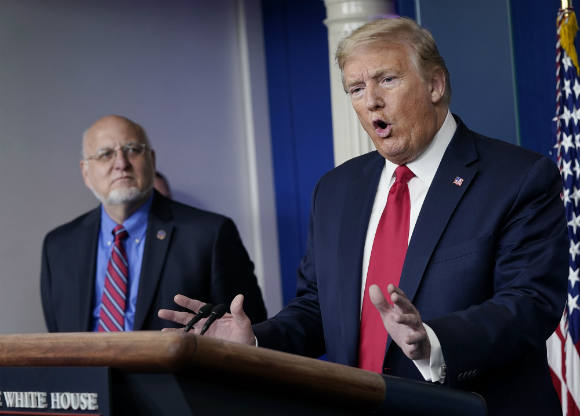
SPONSORED CONTENT — FACEBOOK
Facebook’s data tools are helping researchers better understand COVID-19
New results from a symptom survey run by Carnegie Mellon University Delphi Research Center show how data tools can support a stronger response to COVID-19.
See how Facebook is doing it, while protecting privacy.
LEADING THE DAY
ADMINISTRATION: The president on Wednesday continued to champion the restoration of American “prosperity,” balanced against “reasonable precautions” to stave off COVID-19. He praised coronavirus mitigation and planning by California Gov. Gavin Newsom (D) but publicly rebuked Georgia Gov. Brian Kemp (R) for his decision this week to reopen hair, nail and tattoo salons and massage parlors, which challenges the potential for social distancing in a state in which at least 20,099 people have been infected and 837 have died, according to The New York Times state tracker.
Kemp said his plan to reopen such businesses on Friday will not change, despite the president’s remarks (The Atlanta Journal-Constitution).
“I disagree strongly with his decision,” Trump said, referencing a phone conversation he had with Kemp on Wednesday. The president said he shared his opinion with the governor but would not intervene. “He has to do what he thinks is right” (The Hill).
“I would advise him not to just turn the switch on and go because there is a danger of a rebound,” Anthony Fauci, director of the Institute for Allergy and Infectious Diseases, added in response to a question about Kemp’s decision, which runs contrary to the White House guidelines to states.
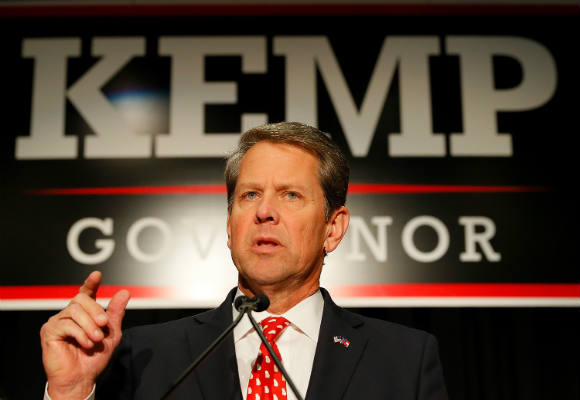
The Associated Press: Trump is nudging the country to reopen while also embracing federal recommendations that some states have bypassed.
“Some of the governors are opening up their states, and I feel it. There was a great spirit today,” Trump said, pointing to Wednesday’s stock market activity. “I feel much better today than I did two or three days ago, and I think the world does.”
The number of U.S. confirmed cases of coronavirus climbed to 842,624 today, as of the latest information.
The Hill: Trump and Centers for Disease Control and Prevention Director Robert Redfield tried on Wednesday to walk back Redfield’s comment during an interview that the coronavirus contagion, which could move in waves, might be worse this fall than it is now. “I didn’t say this was going to be worse. I said it was going to be more difficult,” Redfield said.
Trump said he “hopes” a Fourth of July event in Washington, D.C., this year can replicate the parade, fireworks and military showmanship he helped organize in 2019 on the National Mall. Social distancing and behavioral changes could be followed by large crowds, he suggested. The president’s public health experts on Wednesday repeated that COVID-19 will remain a national risk through the summer and into this fall.
The Wall Street Journal: During a podcast interview, Vice President Pence said the coronavirus could be largely in the past in the United States by June, five weeks from now. He said the country is prepared if a second wave of infection hits.
Reuters: The nation’s national parks and public lands will soon reopen in line with federal coronavirus guidelines, Trump said on Wednesday.
> Immigration: A day after announcing he would sign an executive order to end immigration temporarily in response to the pandemic and rising unemployment, the president issued a proclamation on Wednesday that suspends the issuance of green cards to some immigrants (NPR). The restrictions apply only to aliens who are outside the United States as of April 23, do not have a valid immigrant visa and do not have an official travel document other than a visa that permits entry to the United States.
The proclamation includes a list of exceptions, including for those currently in the country, people who have valid immigrant visas, those seeking entry to work as physicians and nurses, and the spouses and unmarried children of U.S. citizens.
Trump said he was asking the administration to review guest worker programs to assess if more steps were needed to protect U.S. workers. “We don’t want to hurt our farmers,” Trump added, referring to the business community’s eagerness to continue to hire and bring in migrant workers (The Hill and The Associated Press).
> U.S. Navy: 26 U.S. warships are experiencing COVID-19 cases now, and another 14 ships have experienced the contagion but the crew members impacted have recovered, a senior Navy official told CNN on Wednesday. The 26 ships with current cases are in port or maintenance yards.
***
POLITICS: While the Trump administration’s coronavirus guidelines warn against unnecessary travel, top White House aides are looking for ways to get a “frustrated” president out of Washington and on the road.
According to NBC News, senior advisers are actively looking into plans to get Trump out of the White House from time to time, including potential trips to visit and meet with health care workers, first responders and Americans who have lost jobs during the outbreak. The report cites two sources familiar with discussions.
The aides have pointed to the week of May 4 as the target time for potential travel “in a safe and responsible way.” The news comes after Vice President Pence made a pair of trips this week to Colorado and Wisconsin. Among the future events on Trump’s schedule is a mid-June appearance at the U.S. Military Academy’s graduation in West Point, N.Y.
“Like many Americans, the president is looking to travel when it is safe to do so,” one senior administration official said.
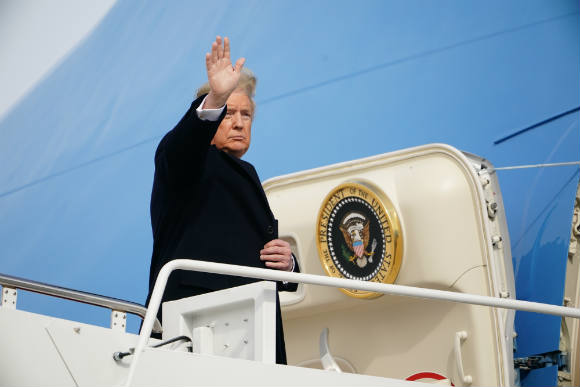
> Trump plays to his base: The president is attempting to shore up his base amid criticisms over his response to the ongoing coronavirus pandemic, deciding to go back to his familiar playbook on immigration, the wall and tough talk about China.
As Niall Stanage writes, the most notable example is the president’s proclamation to temporarily limit some legal immigration, arguing it will protect American workers. However, he also has called for governors of multiple states to “LIBERATE” their citizens from stay-at-home orders and lockdowns due to the virus and attacked the media at his near-daily briefings, and he is now making aggressive noises about Iran.
Critics see the moves as evidence of rising concern among Team Trump about his reelection prospects, and new polls show that to be the case. According to new Fox News surveys released Wednesday evening, former Vice President Joe Biden leads Trump by 8 points in both Pennsylvania (50 percent to 42 percent) and Michigan (49 percent to 41 percent).
> Veepstakes: Democrats believe Biden should expedite the selection of his running mate in order to give himself and his VP nominee more time to fundraise and unite the party ahead of Nov. 3.
As Amie Parnes notes, Democratic nominees normally roll out their running mates shortly before the party’s convention in July. However, with the novel coronavirus outbreak pushing the campaign off the trail and forcing the party to postpone the Democratic National Convention until August, some Democrats believe an early announcement could do Biden a world of good.
“There will be nothing traditional about this election season, so why should how a candidate rolls out their VP,” said Democratic strategist Michael Trujillo. The strategist added he’s all for an early announcement because it would “give the Biden campaign an infusion of campaign donations” and double the amount of campaigning. “She can help raise more money, get activists engaged, do one-on-one interviews in key media markets and build more enthusiasm for the ticket immediately.”
The Washington Post: Biden makes end run around Trump as the president dominates the national stage.
The Associated Press: Al Gore says backing Biden isn’t “rocket science.”
IN FOCUS/SHARP TAKES
STATE WATCH: Southern and Midwestern states moved ahead on Wednesday with plans to reopen their economies in hopes the worst of the coronavirus pandemic had passed, but California’s governor held firm to stay-at-home orders and business closures now in place (Reuters).
As states create a ragged patchwork of eased restrictions, the cultural and political divides become evident. Restless and financially stressed families agitate to get back to work, and affluent Americans exult over pre-COVID-19 pleasures, such as playing golf and shopping in person.
Public health experts believe some governors are gambling with lives. “The math is unfortunately pretty simple. It’s not a matter of whether infections will increase but by how much,” said Jeffrey Shaman, an epidemiologist at Columbia University (The Washington Post).
Beaches are opening in Florida. In South Carolina, consumers can head to stores for clothes, sporting goods, books, music and jewelry. In Texas, state parks are opening, elective surgeries are back on the calendar and retailers will soon open for pick-up. With every prediction about new COVID-19 outbreaks and deaths, governors say they’re prepared to do testing and contact tracing and are assured they have hospitals that can handle new cases of disease (The Hill).
The return to work, school and travel in individual states will not fill the holes in some state budgets, however. States will need billions of dollars, and perhaps trillions, to stay afloat, reports Reid Wilson.
The Associated Press: Take a look at where states stand on reopening.
The Associated Press: Health care workers at veterans hospitals are paying a heavy price as thousands of nurses and specialists become infected with COVID-19 and many thousand more are quarantined after exposures. The pathogen has killed at least 20 VA employees.
Despite the optimistic stampede toward the “new normal” as U.S. infections continue to rise along with U.S. fatalities from the coronavirus, a respected infectious disease model often cited by the White House warns that no state should open before May 1. South Carolina and Georgia, which are leading the pack to get their economic engines humming again this week, should not open until June 5 and June 19, respectively, according to the model maintained by the Institute for Health Metrics and Evaluation at the University of Washington. It was last updated on Tuesday (CNN).
> Maryland: Gov. Larry Hogan (R), chairman of the National Governors Association, says his state is prepared to announce a plan on Friday to begin lifting coronavirus restrictions (WBAL).
> Mississippi: The state’s attorney general, Lynn Fitch, on Wednesday said she is preparing to sue China over losses caused by COVID-19, which originated in Wuhan in November or December and became a pandemic (Fox13 Memphis).
> Massachusetts: Harvard University announced on Wednesday it will return $9 million in federal assistance it received through a law enacted in late March to provide coronavirus relief, including for higher education. Trump praised the decision, along with the planned return of federal funds announced by other elite universities, including Stanford and Princeton. The academic institutions, all with large endowments, were publicly criticized at the White House and in Congress for applying to use taxpayer funding in a crisis to bolster their private programs (The New York Times).
***
INTERNATIONAL: World Health Organization (WHO) Director-General Tedros Adhanom Ghebreyesus said Wednesday that he is hopeful the Trump administration will reverse itself and resume sending funds to the organization.
The WHO chief made the remarks during a press conference in Geneva, saying that his attention was centered on ending the COVID-19 pandemic.
“I hope the freezing of the funding will be reconsidered and the U.S. will once again support WHO’s work and continue to save lives,” Tedros said.
> China: Harbin, the provincial capital of Heilongjiang and a city of 10 million people, is struggling with a new outbreak of COVID-19 as it restricted inbound travel on Wednesday in a push to contain the virus.
Harbin barred all entry to residential zones by those living outside the province, having already ordered those arriving from outside the country or traveling from hot spots to isolate immediately. The news comes as China continues to slow the spread from those traveling from Russia, which has seen its number of cases escalate in recent days and weeks (Reuters).

> Iran: Trump tweeted a warning on Wednesday to Tehran: “I have instructed the United States Navy to shoot down and destroy any and all Iranian gunboats if they harass our ships at sea.” The president’s detractors used social media to mock the concept of flying gunboats (and Trump’s sentence structure). He later told reporters he meant what he wrote. “We don’t want them anywhere near our boats,” he said at the White House. “We’ll shoot them out of the water” (Business Insider).
> Spain: While Spanish officials extended the national lockdown, parents in the European nation are breathing a little easier as the new laws allow them to take children on short walks and get them out of the house for the first time in a month.
The lockdown across Spain was extended to May 9 as the nation continues to grapple with the virus. As of Wednesday night, Spain has the second highest number of cases (208,389) and deaths (21,717). However, after pressure from across the country, the Spanish government acquiesced and is allowing those under 14 to take supervised walks starting on Sunday (NPR).
The Morning Report is created by journalists Alexis Simendinger and Al Weaver. We want to hear from you! Email: asimendinger@digital-release.thehill.com and aweaver@digital-release.thehill.com. We invite you to share The Hill’s reporting and newsletters, and encourage others to SUBSCRIBE!
OPINION
What will Bernie Sanders voters decide in the election this year? by Madison Gesiotto, opinion contributor, The Hill. https://bit.ly/2KuUzXm
When it comes to his pandemic decision, Brian Kemp is who he said he was, by Jim Galloway, columnist, The Atlanta Journal-Constitution. https://bit.ly/3eLzm9w
SPONSORED CONTENT — FACEBOOK
If you need help, or can offer it.
In response to COVID-19, people around the world are coming together to help one another in a show of solidarity and resilience. Facebook’s Community Help is a place where you can offer or request help from your local community.
WHERE AND WHEN
The House will convene at 10 a.m.
The Senate will hold a pro forma session at 5:30 p.m.
The president has no public schedule. However, a coronavirus task force briefing is slated for 5 p.m.
Pence will participate at 11 a.m. in a call with the Department of Housing and Urban Development to discuss the coronavirus and minority needs in the United States. Pence will lead a White House Coronavirus Task Force meeting at 3 p.m. and participate in a press briefing scheduled after 5 p.m.
Economic indicator: The weekly jobless claims report at 8:30 a.m. is expected to show 4.5 million people filed for unemployment claims in the week that ended April 18, potentially bringing the total to 26 million Americans who have lost jobs since March because of the coronavirus and national stay-at-home orders.
The Coronavirus Report, helmed by The Hill’s Editor-at-Large Steve Clemons, has updates and exclusive video interviews with policymakers emailed each day. Sign up HERE!
Hill.TV’s “Rising” program features news and interviews at http://digital-release.thehill.com/hilltv or on YouTube at 10:30 a.m. ET at Rising on YouTube.
ELSEWHERE
➔ Apple Inc.: A flaw in iPhones and iPads may have helped hackers steal data for years from a universe of devices numbering more than half a billion, according to a security firm. The company said it plans to fix the problem (Reuters).
➔ COVID-19’s blood clotting: The coronavirus, which has infected more than 2.6 million people worldwide, damages the human body in gruesome ways. One of the many potentially lethal effects is blood clotting, which has led to strokes in some young and otherwise healthy people, some of whom had no known symptoms of the infection before the strokes (CNN). … In hospitals in New York, Philadelphia, Boston and China in March, doctors conferred about the puzzling blood thickening and clotting impacts of COVID-19 they saw in patients. A new treatment protocol emerged to try to thin patients’ blood with heparin at the outset of care when possible. In the view of neurologists and other specialists, COVID-19 is not merely a respiratory disease. “I’ve never seen any other viruses causing that,” said Pascal Jabbour, a neurosurgeon and professor at Thomas Jefferson University Hospital in Philadelphia (Reuters).
➔ Pets & COVID-19: Two cats in New York tested positive for COVID-19, becoming the first known cases of the coronavirus in pets nationwide. According to Fauci, the Department of Agriculture, and the Centers for Disease Control and Prevention, there is no known evidence that animals can transmit the virus to humans. The news comes after seven tigers and lions at the Bronx Zoo tested positive for the virus (The Associated Press).
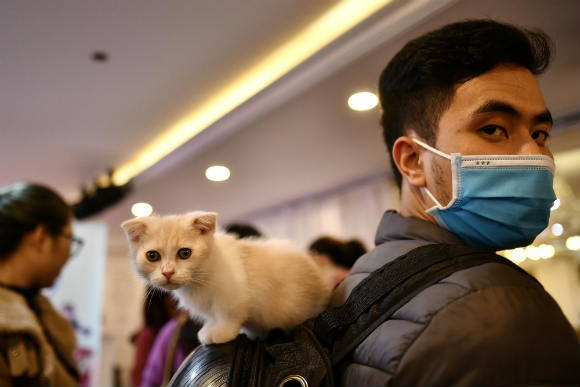
THE CLOSER
And finally … It’s Thursday, which means it’s time for this week’s Morning Report Quiz! Inspired by tonight’s start of the 2020 NFL draft, we’re eager for some smart guesses about the history of the draft.
Email your responses to asimendinger@digital-release.thehill.com and/or aweaver@digital-release.thehill.com, and please add “Quiz” to subject lines. Winners who submit correct answers will enjoy some richly deserved newsletter fame on Friday.
In the 2000 NFL draft, how many quarterbacks were selected before the New England Patriots took Tom Brady with the 199th pick?
- 2
- 4
- 6
- 8
This weekend’s draft will be completed in a virtual setting. Before the pandemic, which city was slated to host this year’s draft?
- Chicago
- Miami
- Las Vegas
- Seattle
In 2008, after which scandal did the NFL revoke the New England Patriots’ first round selection?
- Deflategate
- Spygate
- Bountygate
- None of the above
In 1983, which future star NFL quarterback refused to play for the Baltimore Colts and forced a trade after threatening to play baseball for the New York Yankees?
- Jim Kelly
- Dan Marino
- Steve Young
- John Elway
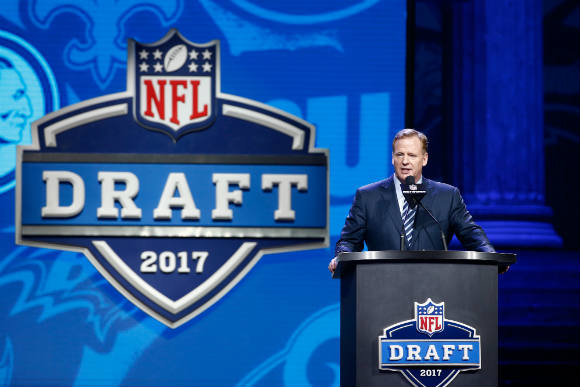
Copyright 2023 Nexstar Media Inc. All rights reserved. This material may not be published, broadcast, rewritten, or redistributed.

